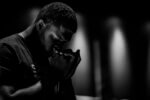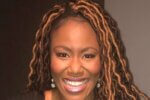The unique subculture of the Western cowboy has been misunderstood and ignored by the church. But charismatic cowboy evangelists are charging out of the corral to boldly share Christ with those riding America’s rodeo circuit.
Dusk is falling on that other “city that never sleeps,” the once-barren outpost that took a gamble on the Nevada desert and hit the jackpot. As the sun sets behind the Spring Mountains, Las Vegas casino workers brace for the standing-room-only crowds nighttime will bring. A few die-hard gamblers have been at it all day; others wander in, looking somewhat revived after sleeping off the effects of the night before. Later, droves of starry-eyed risk takers will inundate the casinos into the early morning hours.
But nowhere in this city of high rollers are the stakes as high as they are on this night at the nearby Thomas & Mack Center, the University of Nevada sports arena. The gamblers here are the athletes who will compete in tonight’s main event before a capacity crowd of more than 17,000. They’re rodeo contestants, and some of them are putting their very lives on the line. A 200-pound cowboy is no match for a 2,000-pound bull.
One-ton beasts aren’t the only challenge cowboys routinely face, however. The national sports media largely disregard rodeo cowboys. Rodeo groupies see them as prey, and outsiders consider them entertainers. Few recognize the sacrifice, skill and strength it takes to do what they do.
Being idolized by fans who place enormously high expectations on them adds to the pressure. And if all that isn’t enough, only a handful of top money winners ever see enough earnings to break even at the end of the year.
Former rodeo contestant Coy Huffman understands all that. That’s why he is here tonight and every night, giving the guys one last word of encouragement, one last reminder of God’s faithfulness, one last prayer for safety and success before they enter the arena. It’s time for Power Up, Huffman’s pre-rodeo service in the big white tent just outside the Thomas & Mack.
“They that have turned the world upside down have come here,” Huffman tells the crowd of 30 or so, half of them on horseback, the rest sitting on hay-bale pews. “Satan and his buddies are about to start asking, ‘Who let the dogs out?'” But the 61-year-old Huffman doesn’t ask the question; he lets the Baha Men handle that through a boom box cued to start playing their hit song at just the right moment.
“They’re going to ask, ‘Who let this bunch of born-again, devil-defying, Jesus-loving, God-glorifying, hot-on-the-trail, heaven-bound hounds loose?'” he shouts as the music fades away. “The gate is opened up so you can ride to victory. Hang on to the Word and ride, cowboy, ride!”
A couple of cowboys let out a whoop; a few start to laugh. Most everyone smiles in amusement. This is about all the reaction Huffman or any other cowboy preacher ever expects to get, even in the most charismatic of meetings. Cowboys can, at times, be a quiet lot.
Even so, the cowboys at the Power Up are part of a move of God never before seen in the rodeo world. It’s a revival found at livestock auctions, in cowboy churches, and on isolated ranches and farms that dot the rural landscape of the Western United States. And it’s one that 1930s Pentecostal preacher Smith Wigglesworth reportedly prophesied would come not only to, but also through, the cowboy community, a less-than-accurate but useful term for describing the culture. This awakening encompasses ranchers, farmers, horse trainers, professional rodeo competitors, cowboys and, of course, cowgirls.
“People are being saved by the tons in the cowboy world,” 66-year-old Glenn Smith, the acknowledged “granddaddy” of cowboy evangelism, told Charisma. “They can come to cowboy services just as they are, in dirty Levis and with cow stuff on their boots, and leave saved.”
As recently as 30 years ago there wasn’t a single outreach aimed at cowboys. Now there is a multitude of evangelistic efforts, many of them charismatic and Pentecostal. In addition to preaching the same gospel, these efforts share at least one other characteristic: mobility. Ministering on the rodeo circuit, providing pastoral care for county-sized ranches and cowboy congregations, discipling potential leaders and maintaining relationships with new converts requires so much travel that some cowboy ministers live in recreational vehicles year-round.
“It would be hard for someone from a regular-type ministry to reach these people,” says Huffman, now a rodeo announcer and traveling cowboy pastor. “I live among them and work with them. You have to build a relationship and prove yourself before they become your friend and listen to you. If I try to bring the message first, I hit a solid wall.”
A Hard Life
Faith is a tough sell among this group known for hard living. It’s no wonder “cowboy” came in at number 246 out of 250 in a ranking of occupations in Jobs Rated Almanac. Ranch cowboys provide backbreaking labor under dangerous conditions for long hours at low pay. Considering that, they’re understandably skeptical when a preacher comes through talking about the “good life”–especially if he’s toting an offering bucket.
There are regional differences in how people respond to the gospel as well. Texas leads the way in spiritual breakthrough. But the northern plains and Rockies are a different story altogether.
“This country here, it’s on harder ground spiritually,” says Brent Baumann, 38, from the Cowboys With a Mission (CWAM) headquarters in Meeteetse, Wyoming, east of Yellowstone National Park. “We’ve seen more people come to the Lord in the last two years, but the growth has been slow and steady in these northern parts.”
Ask those in cowboy ministry what it takes to reach this community, and one word surfaces most often: integrity.
“This is a unique breed of people, but they have one thing in common with God–they are people of integrity,” says Smith, president of Rodeo Cowboy Ministries and the International Western World Outreach Center in Post, Texas. “If a cowboy said he was going to whip me if I showed my face at the Cheyenne rodeo, then I know the first thing that’s going to happen when I pull up into Cheyenne…I’ve got a whipping coming. Cowboys do what they say they’re going to do. Once they began to see that God would do what He said He would do, they began to turn to God in masses.”
Smith, a former bull rider and rodeo clown, is among the few who have seen the cowboy church movement expand from its inception in the 1970s to today’s network of hundreds of churches and ministries worldwide. The challenge these ministries face comes not only from hardened unbelievers, but also from the traditional church world.
Huffman, a graduate of Seattle Bible College who also attended Oral Roberts University and Colorado Christian University, is an ordained minister who heads up Pro Rodeo Ministries and Cowboy Church International in Tucson, Arizona. But because his “church” doesn’t meet within four walls, Huffman says, his is often not considered to be a valid ministry.
Smith is blunt about the way the church treats those in the cowboy community, saints and sinners alike: “The church of Jesus Christ has done more to run those people away from the Lord than you’ll ever know. They’ve condemned them for what they wear. If their cows are calving on Sunday morning and they can’t make it to church, they’ve condemned them for that.
“But God gave us a specific message: Tell the Western people that He loves ’em, He’s not mad at ’em, and He wants to come into their life and
show ’em these things. And that’s just what we tell ’em.”
Rural Revival
One of those who heard that message loud and clear is steer wrestler Rope Myers, now among the top 15 competitors in his event and one of the few who turn something of a profit each year. Though he came to know Jesus at a youth rodeo when he was 12, Myers, now 31, all too soon made rodeo his god. That wasn’t hard to do. His father, Butch, and brother, Cash, both rodeo professionally while his wife, recording artist Candice Myers, also grew up in a rodeo family.
“I learned that I had to put God first in my life, but the real change came when I realized that God is supposed to be first, last, second, 25th and every other place in your life,” says Myers, who is from Van, Texas. “When you’re loving on your wife or taking care of your kids, you’re still keeping God first, because you’re pleasing Him.”
Pleasing God is one thing that seems to come easily to newly converted cowboys, Myers believes. In a sense all cowboys, but especially rodeo cowboys, live by faith; they have no guaranteed income, little protection against disabling injury and often nothing to fall back on if they fail. Being a cowboy is not only what they are, but it’s also what they do.
“Once a cowboy comes to the Lord, it’s easy for him to start living by faith in God,” Myers explains. “He has the chance to be a light in a very dark place. But it’s hard to go after God when you’re so busy, and you have to travel so many miles, and you don’t have the infrastructure that people in a traditional church have.”
The need for such an infrastructure recently gave birth to a whole new area of ministry: the cowboy-style cell group. Myers, along with professional team roper Allen Bach and several others, formed a ministry called Pro Rodeo Partners in Christ that incorporates Bible study, prayer partnering, discipleship and accountability into a flexible format adapted to the cowboy lifestyle.
“We want to come alongside one another and keep each other from making the kind of mistakes you can’t come back from,” Myers says.
Creativity and flexibility are critical to success in reaching cowboys for Christ. Innovative ministries include events such as “church ropings,” which are rodeos that offer prize money without charging an entry fee–something unheard of
in traditional rodeos. The catch is that contestants must listen to a bit of preaching, which most of them are glad to do to avoid shelling out any more money to rodeo producers.
And then there’s Cowboy Bistro, launched several years ago by Ted and Linda Wiese of Rocking W Rodeo Ministry in Likely, California. Ted is a former rodeo cowboy and bullfighter, well-known on the rodeo circuit. In 1998, the couple briefly put Ted’s evangelistic ministry on hold so Linda could attend culinary school. Today, they prepare “gourmet comfort food”
in their $100,000 professional mobile kitchen and serve free meals to rodeo workers and contestants.
The Wieses rely on donations from ministry partners, Christian cowboys who tithe off their earnings and people who drop money in donation buckets at meal sites.
“The cowboys know who we are and why we do this,” says Chef Linda, as she’s called these days. “They’ll walk right in to my mobile kitchen and want to talk while I’m cooking. We’ve discovered just what a privilege this is. It’s all about servanthood.”
Easily overlooked on the male-dominated rodeo circuit are the women, including the cowgirls who compete in barrel racing–the only event open to women on the professional circuit–and the wives and girlfriends of cowboys. But Donna Huffman is able to minister to them as she travels with her husband. She and Coy spend most of the year on the road.
“The women see that we’re there for them,” says Donna, a former barrel racer. “Many relate better to a cowboy ministry. They need someone they know and trust, someone they can safely go to for spiritual help.”
Women such as Donna Huffman and Candice Myers, who arranges her public singing schedule to coincide with Rope’s rodeo schedule, know the toll rodeo life takes on families. They see women around them struggling with financial uncertainty, weeks of separation, adulterous relationships, alcohol and drug abuse, and the fear of injury or even death. All that and more wreaks emotional havoc on rodeo families.
“The rodeo lifestyle is hard,” Donna says. “But over the years I’ve seen a lot of women come to the Lord, women who didn’t feel comfortable in a local church. They want to talk to somebody who understands their lifestyle.”
When they started out in cowboy ministry 25 years ago, the Huffmans found it difficult to direct new converts to churches they were sure would accept them “as is.” Today, they have fewer problems steering a new believer in Christ to a nearby cowboy church or house group.
“Once you realize how much of our population is rural, you see the potential for this type of ministry,” Donna says of the cowboy ministry movement. “It takes time and perseverance, but we’re reaching an entire group of people that haven’t been reached by the conventional church.”
Marcia Ford is a free-lance writer and editor and a former associate editor for Charisma. She is the author of Charisma Reports: The Brownsville Revival and lives in DeBary, Florida, with her husband and teen-age daughters.
REACHING THE UNREACHED
Saddled Up For Jesus
Brent Baumann is a missionary, but he doesn’t live overseas. He’s the founder of Cowboys With a Mission, an outreach to cowboys around the world.
Six months after attending a Youth With a Mission (YWAM) Discipleship Training School, Brent Baumann still wasn’t sure how he fit into the international ministry. The son of a Montana rancher, Baumann was called to missions work but felt more at home on a ranch than in a traditional YWAM setting.
As Baumann helped his father calve cows in the spring of 1995, God showed him how he could use the YWAM ministry model to reach the cowboy culture so familiar to him. That year, he founded Cowboys With a Mission (CWAM), a ministry that reaches horsemen around the world from its headquarters in the tiny town of Meeteetse, Wyoming.
“I was minding my own business when the Lord gave me the vision to train cowboys to go on mission trips,” Baumann told Charisma. “We’re just as concerned for herdsmen in Mongolia and Tibet as other ministries are for rodeo competitors.”
Today, CWAM teams travel to Central Asia, South America, Africa and Australia to work among cowboys. CWAM also maintains an office in Brazil and plans to open a third office in Australia. At home, the ministry holds rodeo camps for youth on its 40-acre ranch and conducts cowboy church services throughout Wyoming and Montana.
The “come as you are” attitude of most cowboy ministries permeates CWAM as well. “We don’t care how you smell or how you dress. You don’t have to be a cowboy,” Baumann says. “We just want you to come.”
No matter where CWAM missionaries go, locals seek them out–all because of their cowboy hats. “It’s part of the attraction of the American cowboy,” Baumann explains. “Regardless of what culture we’re in, people feel comfortable approaching us.”
Richard Ashley, a missionary in Mexico with Rodeo Cowboy Ministries, was once followed by two young boys who kept calling him “J.R.” While Ashley would prefer a different role model to the character on the 1980s TV drama Dallas, he’s not complaining; anything that makes him more accessible to the lost is fine with him.
“People idolize cowboys,” Ashley says. “We have such a wonderful opportunity to preach the gospel because we’re cowboys. We can go where no one else can.”
That includes countries that are hostile or even closed to the gospel.
One such country, Ashley says, overlooked the cases of Bibles he brought in since he was also bringing in free saddles for cowboys. Pastors cried openly when they saw the study Bibles Ashley had transported specifically for them.
While the blessings are many, so are the challenges. Financial support doesn’t come easily, nor does prayer support. As with other cowboy ministries, missions groups have difficulty being taken seriously by traditional churches in the United States.
“We’re treated like a sideshow at a carnival,” Baumann says. “Pastors roll their eyes when we express interest in speaking at their churches. They might see cowboys as a mission field, but they don’t recognize cowboys as missionaries. They don’t realize that we’re very serious about the work we do.”






Leave a Comment
You must be logged in to post a comment.